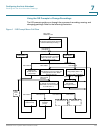
Configuring the Auto Attendant
Writing an Auto Attendant Script
SPA9000 Voice System Administration Guide 142
7
Elements of XML Scripting Grammar
This section includes the following topics:
• “Audio Instruction,” on page142
• “Action Instruction,” on page143
• “Noinput Instruction ,” on page143
• “Nomatch Instruction,” on page144
• “Menu Matched Instruction for Touch Tone (DMTP) Input,” on page144
Audio Instruction
The following is an example of the audio instruction:
<audio src= “prompt1” bargein= “T”/>
The Auto Attendant plays the audio file that is specified in the
src
attribute. When
playing the audio, the Auto Attendant allows the caller to interrupt the current
prompt by pressing digits when the bargein attribute is set to T. The Auto
Attendant ignores any digits from the caller if bargein is set to F. The default value
of the bargein attribute is T.
<match>
<case input=”*”>
<audio src=”prompt4”/>
<exit/>
</case>
<default>
<audio src=”prompt2”/>
<xfer name=”ext”
target=”$input”/>
</default>
</match>
If the user input matches the dial plan, the
response depends upon the user entry:
• If the user presses *, the Auto
Attendant plays Prompt 4:
Good-
bye
.
• If the user presses any digits other
than *, the Auto Attendant plays
Prompt 2 (
Your call has been
transferred.
) The call is transferred
to the extension number that the user
entered.
</form>
The form is ended.
</aa>”
The script is ended.
Script Elements Purpose


















